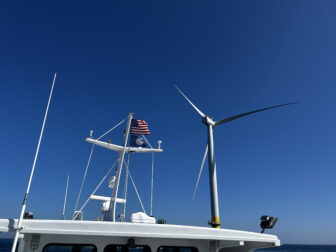By Robert McCartney
Dominion Virginia Power drew a lot of favorable publicity this month by leasing a patch of the Atlantic Ocean off Virginia Beach to construct an offshore wind farm hailed as a clean-energy milestone for the state.
Too bad there’s good reason to believe Dominion will never build it.
Even as Dominion executives publicly stressed wind power’s potential, their statements and company documents showed they have no intention of building anything larger than a small, two-turbine offshore test project unless the costs come down.
“We think it is a large-scale, sustainable resource, but we need to work on the cost,” said Mary Doswell, senior vice president for alternative energy solutions.
Dominion’s own 15-year projections, in its Integrated Resource Plan filed with the state, show Virginians getting no electric power from offshore wind.
“Actual construction of such facilities must await technological advances that would reduce costs,” the plan says.
Instead, the company foresees increasing its reliance on fossil fuels, primarily natural gas. That would miss an excellent opportunity to reduce greenhouse gas emissions to help slow global warming. It would also pass up an early chance to commit to a promising new industry with potential to create thousands of jobs.
Here’s the problem with Dominion’s analysis: It looks only at the costs in dollars and cents. By that measure, admittedly, offshore wind is currently about three times as expensive as natural gas.
But Dominion’s bookkeeping doesn’t take into account the health and environmental costs of continuing to rely on fossil fuel.
“Asthma for kids, acid raid, smog, sea level rise, shoreline retreat in Hampton Roads, none of that shows on your Dominion Power bill. If it did, we’d be building offshore and onshore wind turbines as fast as we could,” said Mike Tidwell, director of Chesapeake Climate Action Network.
I’d like to believe Dominion when it insists it is eager to find ways to lower the dollars-and-cents costs to make offshore wind a reality. Doswell said that could include using less steel in the turbines, arraying them more efficiently and saving money on ships that would install and maintain a wind farm.
The company hopes to win a federal grant to build the small test project to get what Doswell called “real-life experience.”
The pilot would have a capacity to generate 12 megawatts, compared with 1,500 to 2,000 megawatts if the whole Virginia wind farm is built. The latter would provide enough juice for about 700,000 homes.
Everyone, including Dominion, agrees that the Virginia coast is a nearly ideal spot for offshore wind turbines. It combines strong winds, shallow water and first-class ports.
Unfortunately, the company’s record doesn’t inspire a lot of confidence. Both the utility and the state, with its historic commitment to coal, are laggards in promoting clean energy.
Dominion has fought measures adopted in other states to use subsidies, mandates or other public policies to promote new energy technologies. Its voice counts for a lot in Richmond, as its political action committee is typically the largest corporate contributor to election campaigns.
Partly because of Dominion’s influence, there isn’t a large-scale solar energy facility or onshore wind farm in Virginia. Unlike dozens of other states, Virginia does not require electric utilities to obtain a minimum percentage of power from renewable sources.
By contrast, Maryland requires utilities to obtain 20 percent of their electric power from renewable sources by 2022. Gov. Martin O’Malley (D) recently proposed to raise that minimum to 25 percent.
Environmentalists fear that Dominion snapped up the offshore wind lease as a public relations ploy and to block a rival from outshining it. Dominion outbid Apex Clean Energy of Charlottesville, which exclusively develops wind and solar power.
The cost for the federal lease, $1.6 million, was pocket change for Dominion. Last year, its parent company reported operating earnings of $1.75 billion.
“For a cheap price, they’re able to bask in the glow of perceived greenness and prevent another company from grabbing the mantle of offshore wind,” Tidwell said.
Dominion should prove it’s serious by spelling out to the public what specific steps it’s going to take to develop this tract.
“Actions speak louder than words. It should show a timeline for getting steel in the water,” said Jim Lanard, president of the Offshore Wind Development Coalition, which includes Apex.
Just as important, Dominion should start supporting public policies to promote clean energy. Then it would live up to its self-promotion as a friend of the environment.





